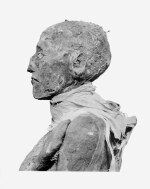New discovery promises to revolutionize the treatment of osteoporosis
Discovery promises to revolutionize the treatment of osteoporosis, offering new hope for those who suffer from it. Learn more here!...
Table of Contents
- Do mice hold the key to strong bones?
- The Mysterious Power of CCN3
- A promising future for osteoporosis
- Final Thoughts: What Does the Future Hold for Us?
Follow Patricia Alegsa on Pinterest!
Do mice hold the key to strong bones?
Imagine being told that a mouse could become the hero of bone health. It sounds like a movie plot, but the reality is that researchers at the University of California in San Francisco have made a surprising discovery.
They have discovered a hormone called CCN3 in female mice that could change the game in the treatment of osteoporosis.
Yes, that disease that makes our bones turn into fortune cookies.
During lactation, mothers' bodies use calcium from their bones to produce milk. Like a magic trick, it is expected that the bones will weaken.
During lactation, mothers' bodies use calcium from their bones to produce milk. Like a magic trick, it is expected that the bones will weaken.
But here comes the surprise: this bone loss is temporary and resolves within six to twelve months.
I suggest you schedule to read this article: Does eating eggshells help incorporate calcium into our bodies?
Holly Ingraham and her team stumbled upon CCN3 while investigating how bones remain strong during lactation. They inhibited estrogen production in female mice and, instead of weakening, their bones became stronger.
I suggest you schedule to read this article: Does eating eggshells help incorporate calcium into our bodies?
The Mysterious Power of CCN3
Holly Ingraham and her team stumbled upon CCN3 while investigating how bones remain strong during lactation. They inhibited estrogen production in female mice and, instead of weakening, their bones became stronger.
Bingo! Upon further study, they discovered that CCN3, produced only during lactation, plays a crucial role in bone health.
Imagine the bones of these mice as a gym in full swing. After surgically connecting mice with strong bones to those with weak ones, the weak bones started lifting weights!
Imagine the bones of these mice as a gym in full swing. After surgically connecting mice with strong bones to those with weak ones, the weak bones started lifting weights!
A 152% increase in bone volume was recorded. And here’s where science gets exciting: could CCN3 be the magic spark we need to combat osteoporosis?
The researchers didn't stop there. They applied CCN3 in patches to male mice with bone fractures and, surprise! Bone volume increased by 240%. It's as if they gave those mice a magic potion to repair their bones.
A promising future for osteoporosis
The researchers didn't stop there. They applied CCN3 in patches to male mice with bone fractures and, surprise! Bone volume increased by 240%. It's as if they gave those mice a magic potion to repair their bones.
But, before you get too excited, it's important to remember that these are just results in mice. The big question is: will it work in humans as well?
Holly Ingraham warns that further research is needed. Currently, the team is developing a blood test to measure CCN3 in breastfeeding women. Imagine the possibility of a treatment that could help millions of people suffering from osteoporosis.
Holly Ingraham warns that further research is needed. Currently, the team is developing a blood test to measure CCN3 in breastfeeding women. Imagine the possibility of a treatment that could help millions of people suffering from osteoporosis.
It's as if we're one step away from discovering the fountain of youth, but for bones!
In the meantime, I suggest reading: the importance of sexuality in old age.
In the meantime, I suggest reading: the importance of sexuality in old age.
Final Thoughts: What Does the Future Hold for Us?
The discovery of the CCN3 hormone has opened a new chapter in bone health research. While there is still a long way to go, it is a ray of hope in the fight against osteoporosis.
What do you think about this research? Do you think it's possible for a mouse to change the way we understand bone health?
Science is advancing by leaps and bounds, and who knows, maybe soon we will have a new ally in our fight to keep our bones strong and healthy. So keep an open mind and stay informed!
Subscribe to the free weekly horoscope
Aquarius Aries Cancer Capricorn Gemini Leo Libra Pisces Sagittarius Scorpio Taurus Virgo
-
 Insomnia and Academic Performance: Impact on Children and Adolescents
Insomnia and Academic Performance: Impact on Children and Adolescents
Discover how insomnia impacts academic performance in children and adolescents, affecting concentration, memory, and mood. Learn more here! -
 Watch Out! Your makeup brushes might harbor more bacteria than a toilet
Watch Out! Your makeup brushes might harbor more bacteria than a toilet
Surprise! Makeup brushes can harbor more bacteria than a toilet. Make sure to clean those brushes thoroughly to avoid a germ party. -
 Recent scientific advances: how anxiety affects your well-being
Recent scientific advances: how anxiety affects your well-being
Managing daily fear and anxiety enhances your emotional well-being and improves your cognitive efficiency. Transform your life today! -
 Washing your sheets weekly is key to your health and rest!
Washing your sheets weekly is key to your health and rest!
Did you know that your sheets are the favorite nightclub of bacteria and mites? Learn with this article the medical reasons and tricks to maintain hygiene in your bedroom and improve your quality of life. No more excuses for not changing the sheets! -
 Tuna: Health Benefits and How to Avoid Mercury Risks
Tuna: Health Benefits and How to Avoid Mercury Risks
Discover the health benefits of tuna and learn how to minimize mercury risks. Find out the recommendations from experts on safe consumption.
I am Patricia Alegsa
I have been writing horoscope and self-help articles professionally for over 20 years.
Subscribe to the free weekly horoscope
Receive weekly in your email the horoscope and our new articles on love, family, work, dreams and more news. We do NOT send spam.
Astral and numerological analysis
-
 Discover your future, secret personality traits and how to improve in love, business and life in general
Discover your future, secret personality traits and how to improve in love, business and life in general
-
 Online Dream Interpreter: with artificial intelligence
Do you want to know what a dream you had means? Discover the power of understanding your dreams with our advanced online dream interpreter using artificial intelligence that responds to you in seconds.
Online Dream Interpreter: with artificial intelligence
Do you want to know what a dream you had means? Discover the power of understanding your dreams with our advanced online dream interpreter using artificial intelligence that responds to you in seconds.
-
 10 Key Foods to Stop Collagen Loss
10 Key Foods to Stop Collagen Loss
Discover 10 foods that halt collagen loss, an essential protein for firm skin and strong bones. Strengthen your body from the inside out! -
 What professions protect you from suffering Alzheimer's?
What professions protect you from suffering Alzheimer's?
A Harvard study reveals that jobs that use spatial memory reduce the risk of Alzheimer's. Discover which professions best protect your mind. -
 Music heals: singing repairs the brain after a stroke
Music heals: singing repairs the brain after a stroke
According to researchers from the University of Helsinki in Finland, singing rehabilitates speech production in post-stroke aphasia: the rehabilitative effect of singing on the brain. -
 Science discovers a link between bipolar disorder and diet
Science discovers a link between bipolar disorder and diet
According to this scientific study, a particular diet helps improve the management of bipolar disorder. Find out in this article! -
 Physical exercise helps combat depression: new evidence reveals its powerful effect
Physical exercise helps combat depression: new evidence reveals its powerful effect
Depression? New scientific evidence confirms that exercise helps reduce its symptoms in adults. Discover how. -
 I wake up at 3 am and I can't go back to sleep, what should I do?
I wake up at 3 am and I can't go back to sleep, what should I do?
Can't fall back asleep after waking up at 2, 3 or 4 am? Here's how to solve this distressing sleep problem. -
 Feng Shui: Place a lemon like this at home and multiply positive energy
Feng Shui: Place a lemon like this at home and multiply positive energy
Discover how to use a lemon to cleanse and elevate the energy of your home according to Feng Shui, harmonizing every space with an everyday gesture. -
 What does it mean to dream of a bath?
What does it mean to dream of a bath?
Discover the meaning of dreams with baths. Have you ever wondered what this dream may symbolize? We explain its interpretation and hidden messages. -
 Strengthen Your Spine and Sleep Better: The Science-Backed Method
Strengthen Your Spine and Sleep Better: The Science-Backed Method
Discover the science-backed method to strengthen your spine and sleep better: low-impact exercises that relieve persistent lower back pain. -
 Zane Phillips at 31 years old: A perfect example of style, talent, and pure sensuality!
Zane Phillips at 31 years old: A perfect example of style, talent, and pure sensuality!
Discover this sexy American actor who captivates with his beauty and talent at 31 years old. -
 Unleash the passion with the sexual secret according to your zodiac sign
Unleash the passion with the sexual secret according to your zodiac sign
Unveil the sexual secret that will drive your partner crazy according to her zodiac sign. Surprise her and enjoy new experiences together! -
 What does it mean to dream of a lake?
What does it mean to dream of a lake?
Discover the fascinating meaning behind your dreams with a lake. Is it a reflection of your emotional state or a signal to make important decisions? Find out here. -
 Revealing the Shocking End of the Pharaoh Ramses III: He Was Murdered
Revealing the Shocking End of the Pharaoh Ramses III: He Was Murdered
Scientists reveal, through advanced technology, the astonishing end of the life of the famous pharaoh, uncovering surprising historical twists.